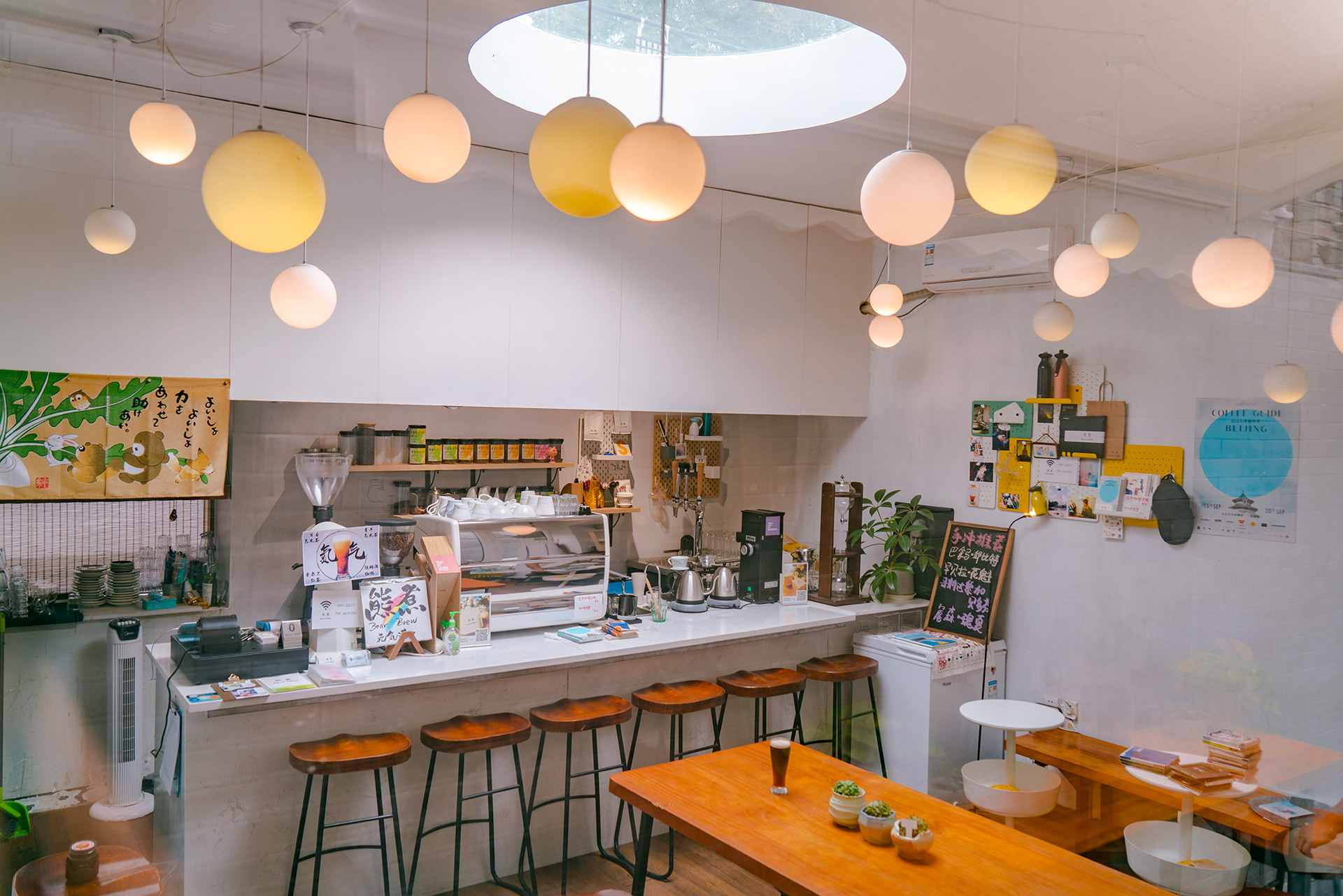
It is a perfect day to visit Bear Brew, a coffee shop tucked into a quiet residential neighborhood on the western side of Beijing.
I ride my electric scooter 40 minutes across town, a straight shot west, skimming along the bottom of Tiananmen Square. En route, I drive past a plethora of other coffee shops. Despite the fact that Beijing is arguably the urban center of China’s illustrious tea culture, specialty coffee shops as well have been making headway throughout the city.
Bear Brew is located in the Xisi neighborhood, which tends to be quieter and a bit less explored than other districts. It is still Beijing, though, so there’s a mass of people going about their day. The pace is just slightly, though still discernibly, slower. I pass through a long, narrow lane that seems barely wide enough for car traffic. To the right side is that ubiquitous grey of Beijing’s hutong (narrow alleyways); to the left is a two-meter tall wall, the garnet red paint peeling and scuffed.
At the very end of the lane, there is Bear Brew at last. The trek is worth it, as the rooftop patio offers one of the most stunning coffee shop views in Beijing, if not all of China. The roof deck, which seats about 15, places coffee drinkers at the foot of the towering and serene White Cloud Pagoda. This historic structure, built when Beijing was first selected by Kublai Khan as the capital of China, is said to be the oldest presence of Tibetan Buddhism in Beijing. Its looming height both dominates and calms.
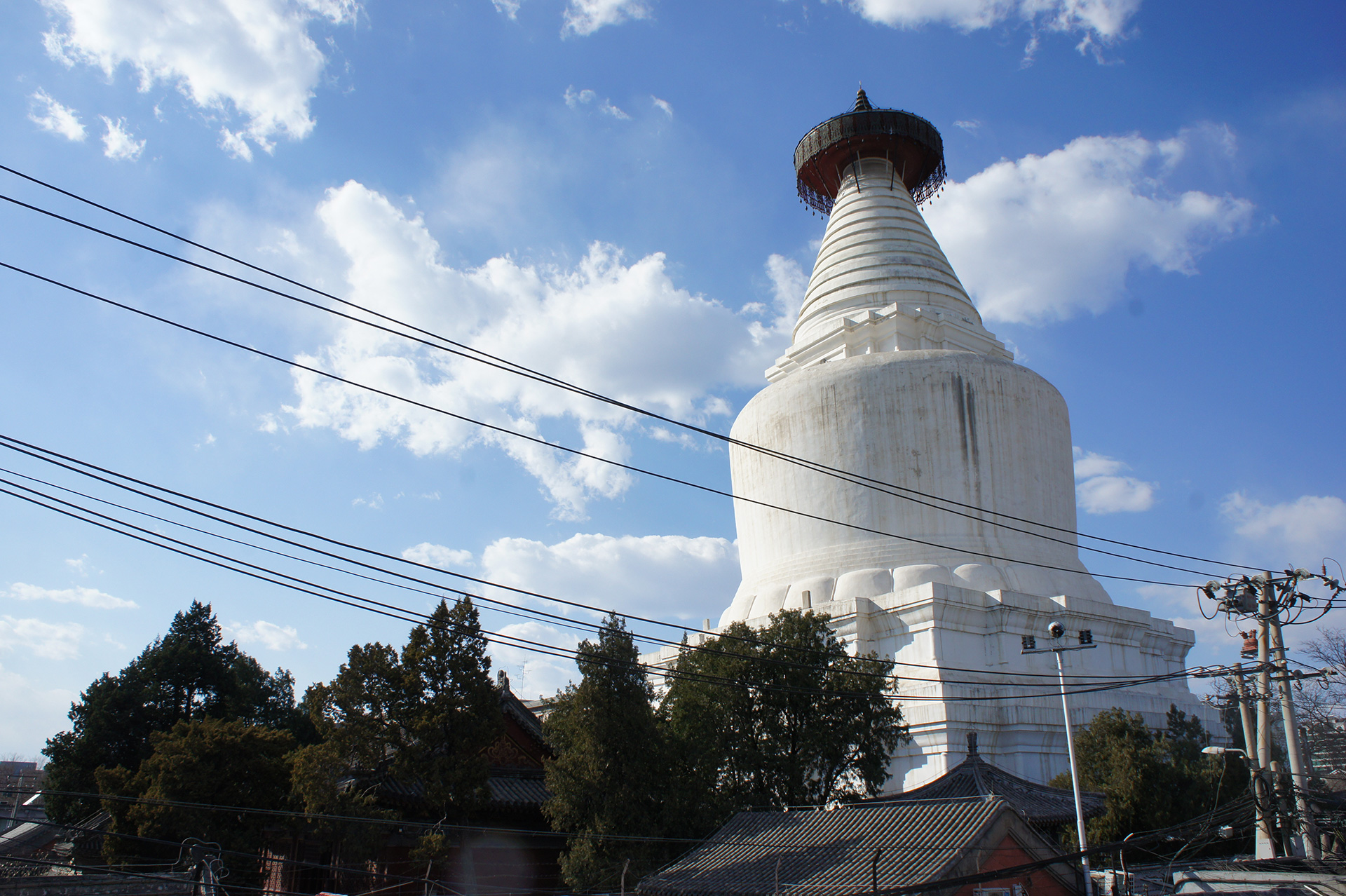
White Cloud Pagoda as seen from Bear Brew
Location is not the only thing that makes this specialty coffee shop… special. As the name suggests, the cafe is owned and run by bears. Not the variety that makes their home in the woods, fond of honey—the queer human kind. In the LGBT community, a “bear” typically refers to a gay male who may be larger in stature and sports a more rugged, fuzzy look.
In Beijing and China at large, queerness falls into a socially grey area—it is not illegal, but depictions of queer people are often censored from art, and the overall cultural climate is not widely accepting of homosexuality. As one of the cafe founders, Ryan Wei says that in choosing the name “Bear Brew” it is an effort to strike a balance between public and private life. On the one hand, they want to be true to themselves and provide an environment that welcomes everyone—gay and straight. At the same time, “we cannot make so much trouble, so we don’t want to push too far.”
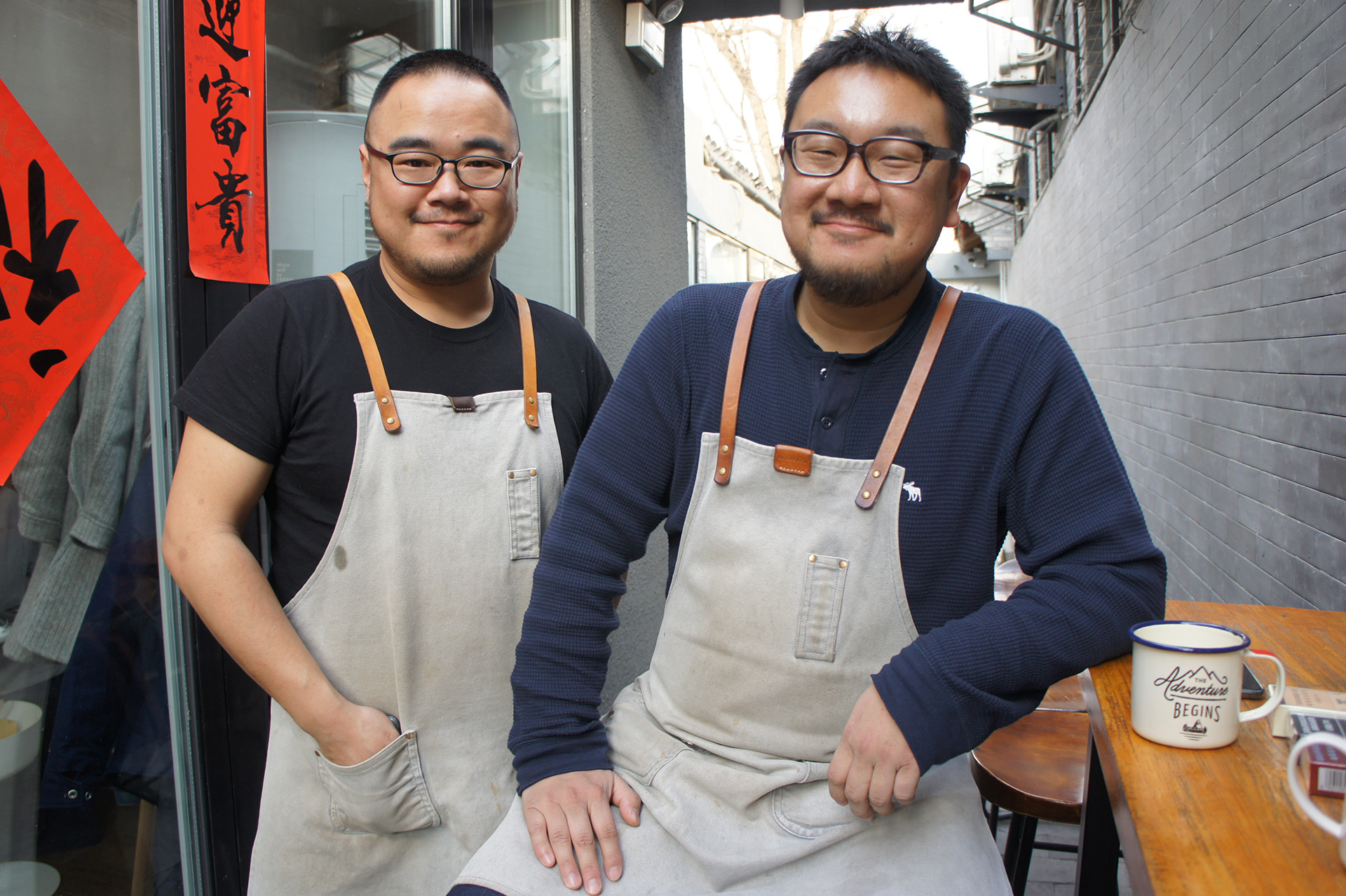
Barista Sean Liu and cafe founder Ryan Wei
A name as innocuous as “Bear Brew” fits the bill perfectly. Those in the know can read between the lines and recognize that this cafe is gay-friendly. For others, there is no additional meaning; the cafe might as well have been named “Teddy Bear Brew.” While the name choice is subtle, it is still significant. In a metropolis as large as Beijing, there are few establishments that make it known that they are gay-friendly.
This has been good for business, and it is a point of pride for Wei: “LGBT folk come here every day, they know this place.” He has even seen guys who are visiting Beijing make a special trip to Bear Brew. “They are hoping to find a pretty boy in this place, [so for some customers] it can be kinda magical.”
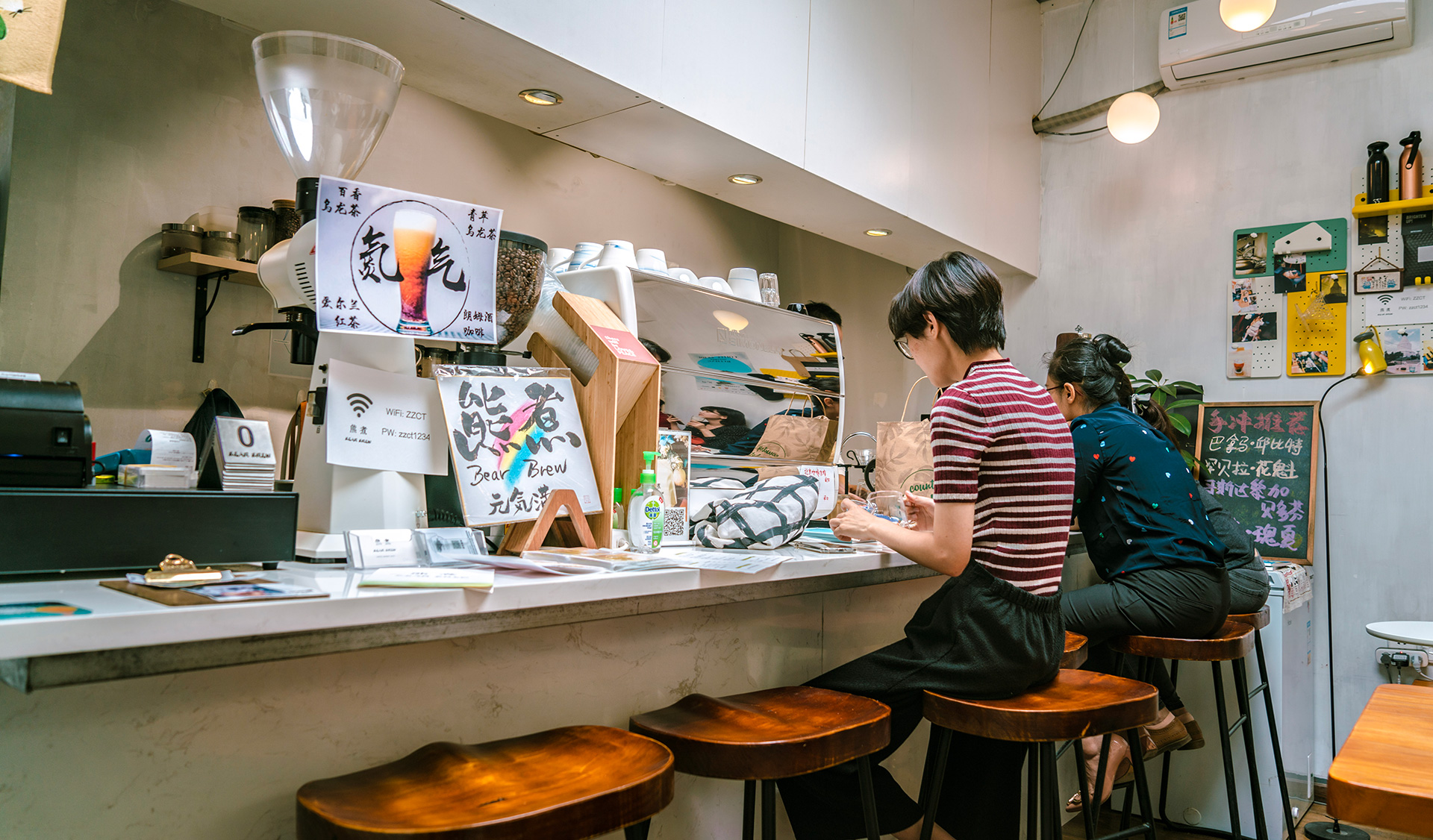
There is definitely a sense of magic at Bear Brew. From the street, one steps through a large wooden frame and is greeted by glass double doors. At this time of year, the entrance is still adorned with those classical bright red banners. Hanging vertically, the paper hosts thick black Chinese characters, rhyming couplets that are thought to bring good luck. Entering the cafe itself the eye is immediately drawn upward to the large skylight window, a perfect circle that drops sunlight around a single white room. There is the sound of light conversation and the whirring sound of freshly ground beans.
Behind the bar is either Wei or Sean Liu, a fellow bear and meticulous barista. Their canvas aprons have leather accents and a small tag with the cafe’s name. While both of them possess specialized knowledge about the intricacies of specialty coffee, they foster an environment of openness and accessibility. Wei’s stance is that “it’s good to be passionate, but don’t push it [onto the customer] too far. Coffee is still starting in China.” Years working as a specialty coffee barista are balanced by an understanding of the local market. Wei phrases it wonderfully, saying that coffee can be a “complicated affair,” but it can also be a daily experience.
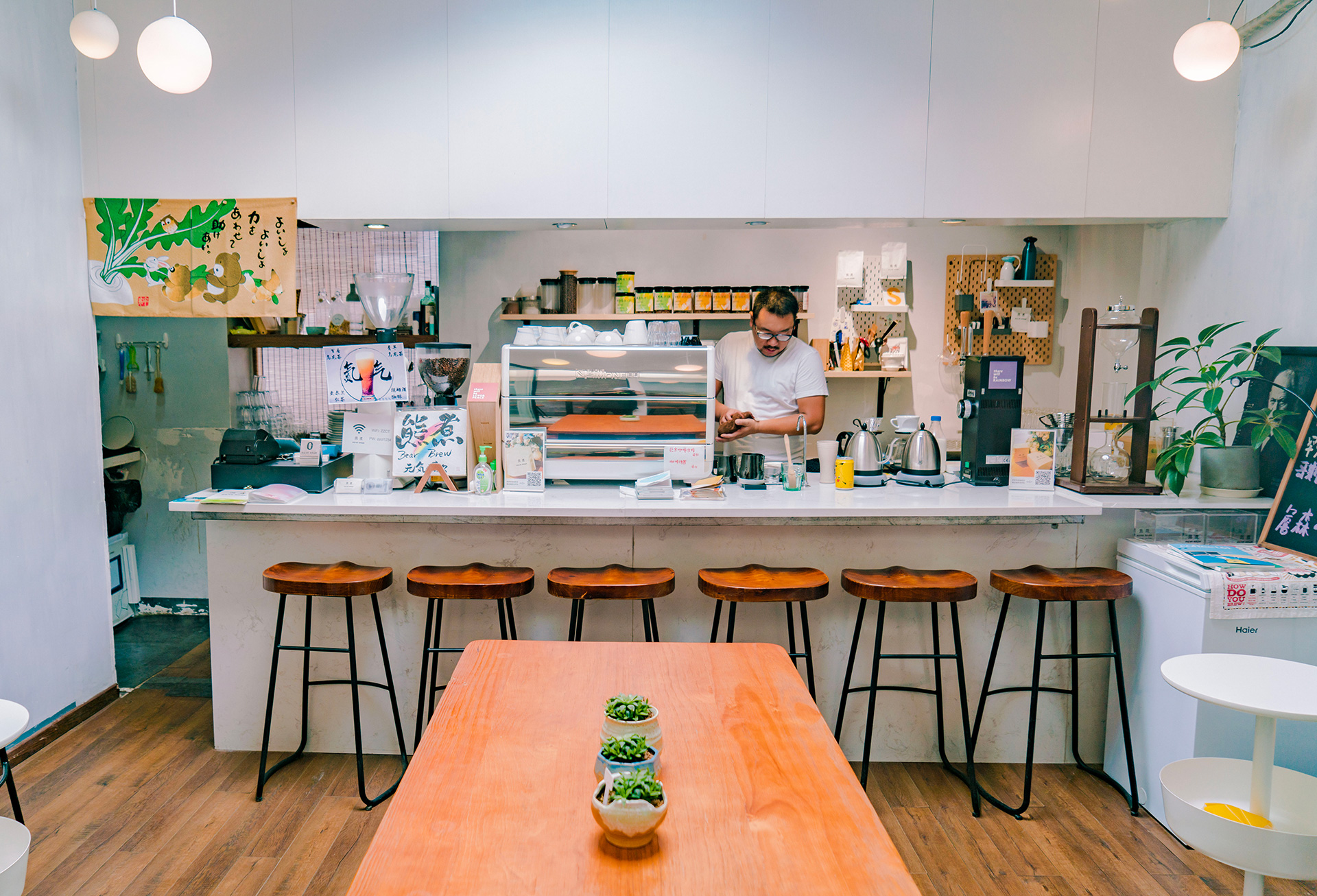
An eclectic crowd gathers at Bear Brew. A middle-aged office worker seems to be escaping the office for an afternoon, quietly and furiously typing away on a laptop; a shy young couple seems to be on a first date; a group of trendy women snap selfies with the White Cloud Pagoda soaring overhead, coffee cups in manicured hands. An older gentleman perches at the corner of the roof deck, alone, wearing those padded, noise-canceling headphones. He slouches in his chair, sips his drink, and gazes calmly at the pagoda. Sean says this is a method of “purifying the heart.” This is not something many coffee shops can offer.
Perhaps it’s the Buddhist influence in the air, perhaps it’s the staff’s own acute understanding of how important patience and acceptance of others is, that has resulted in such a welcoming atmosphere.
I ask Wei if it can get disheartening to be so passionate about coffee, invest time and energy into running a cafe, but find that customers may not always appreciate the effort. He waves off the idea, “they can enjoy third wave coffee invisibly. If they want to ask any questions, we are ready to share everything we know. Or if you just want to drink it, you can. After all, it’s just a drink.”
Bear Brew is located at 26 Baitasi Dong Jiedao, Beijing.
Marjorie Perry is a freelance journalist based in Beijing. This is Marjorie Perry’s first feature for Sprudge.
The post Bear Brew Is Beijing’s Gay-Friendly Specialty Coffee Bar appeared first on Sprudge.

